#chronicons
Explore tagged Tumblr posts
Text

"You took my every gift, you answered my every challenge… I am ensnared by you, Guardian. I wish to possess you as my own until the end of existence."
Entry 2/3 for @h3xxthev3xx ‘s zine, Ishtar Illustrated!
Check out the PDF with everyone’s art and thank you’s to the developers here:
#Destiny2Art#Destiny2AOTW#IshtarIllustrated#art#my art#drawing#destiny 2#destiny 2 art#digital art#zine#the chronicon#dccclxxxix#lore#Destiny lore
60 notes
·
View notes
Text
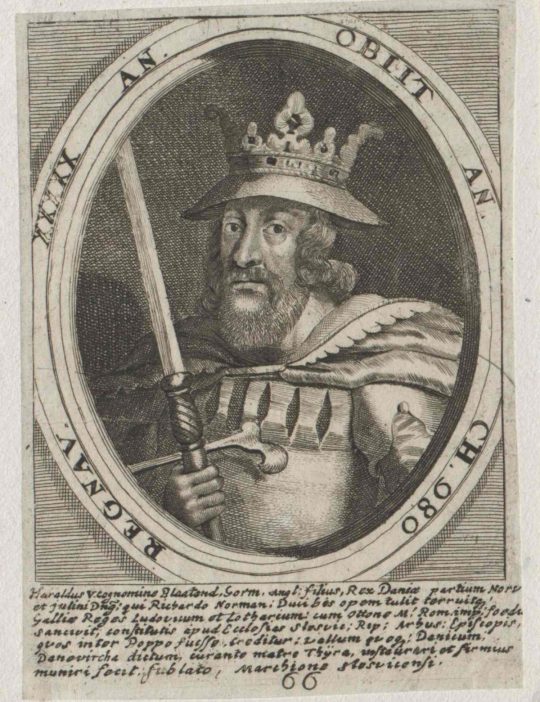
King Harald Bluetooth (d. 985/986).
#engravings#kingdom of norway#Kongeriket Norge#kingdom of denmark#Kongeriget Danmark#house of gorm#House of Knýtlinga#Jelling dynasty#vikings#harald bluetooth#engraving#Konge af Danmark#Norges konge#Chronicon Roskildense#royalty
3 notes
·
View notes
Text

um, sure. why not.
#*about something completely unrelated* omg just as merlin foretold#twelfth century#Chronicon Briocence
1 note
·
View note
Text
youtube
Today I'm checking out a brand new game and my very first roguelike - Chronicon: Survivors! I quickly come to the conclusion I'm not very good at these sorts of games :) In this series I am going through all my unplayed games on Steam and diving in completely blind!
#youtube#pc gaming#gaming#pc games#youtuber#small youtuber#Chronicon#Chronicon: Survivors#bullet hell#bullet heaven#roguelike#Steam games
1 note
·
View note
Text
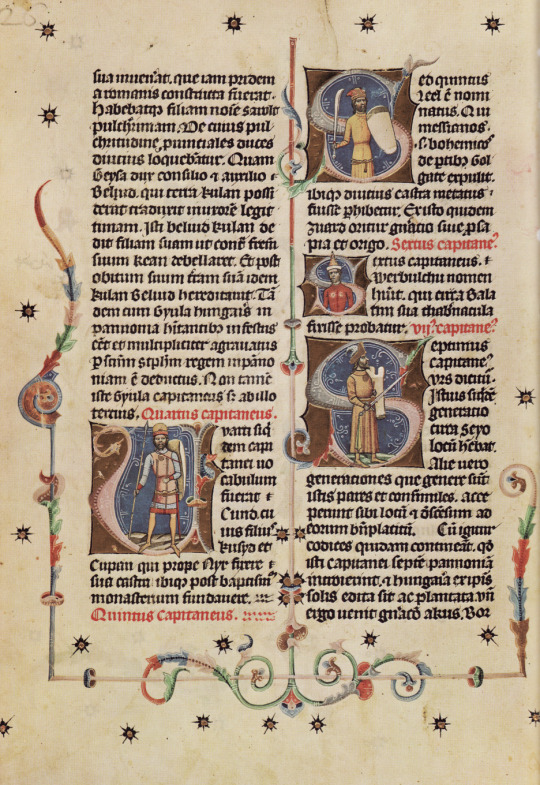
Hungarian captains from the 9th-10th C. CE: Kund (the Fourth Captain), Lehel (the Fifth Captain), Bulcsú (the Sixth Captain), Örs (the Seventh Captain) from the Chronicon Pictum (Page 26), manuscript dated to 14th C. CE.
"943 CE: Allied with the Kievan Rus, a Hungarian army attacks the Byzantine Empire. Emperor Romanos I Lekapenos buys peace, and accepts to pay a yearly tribute to the Hungarians."
-taken from Wikipedia
#illuminated manuscript#antiquities#artifacts#hungarian art#middle ages#medieval art#medieval history#magyar#finno ugric
247 notes
·
View notes
Text
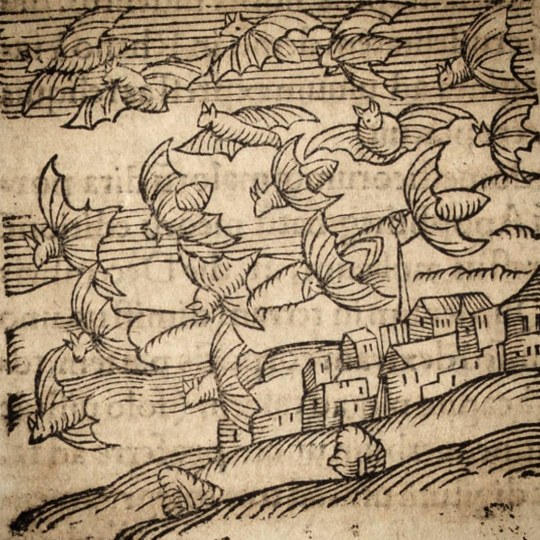
The bats have taken wing in Prodigiorvm ac Ostentorvm Chronicon, 1557 • via oneletter words.com
263 notes
·
View notes
Text

Prodigiorum ac ostentorum chronicon, quae praeter naturae ordinem, et in superioribus et his inferioribus mundi regionibus, ab exordio mundi usque ad haec nostra tempora acciderunt. (1557) Conrad Lycosthenes
#cat#cats#animal#animals#medieval cat#engraving#engraving illustration#engraving art#medieval#medieval art#middle ages#medieval illustration#medieval engraving#1500s
129 notes
·
View notes
Text
Okay, I'm slowly starting to question medieval sources because...
Because:
St. Jerome, Chronicon:
"Palaephatus writes that the Sphinx was really the wife of Cadmus, and, fleeing from poison on account of Harmonia's jealousy, a war was started against the Cadmeans." [1261 BCE]
What do you mean by "The Sphinx was really the wife of Cadmus"? From all women to ever exist why the Sphinx?!
Also I searched for Palaephatus' account (which is supposed to be a rationalized version of the original greek myths) and here's the fragment:
"About the Cadmeian Sphinx it is said that there was a beast with the body of a dog, the head and face of a girl, the wings of a bird, and a human voice. She used to sit on Mt. Phikion and sing to each citizen a riddle. She killed whoever was unable to solve the riddle. When Oedipus solved the riddle, he threw her down and killed her. The account is faithless and weak. No such form can exist, while eating those unable to solve a riddle is childish, and the Cadmeians not being able to shoot the beast with arrows, but instead to watch their citizens being eaten up as enemies, is silly. So the truth is as follows: Cadmus had an Amazonian wife whose name was Sphinx. He came to Thebes, killed Drakon and took the kingdom. Afterwards he took the sister of Drakon, whose name was Harmonia. Sphinx felt that he was going to marry the other woman, so she persuaded many of the citizens to come away with her. They seized most of the money, and the swift-footed hound that Cadmus brought, and took them to Mt. Phikion. There she waged war on Cadmus, setting ambushes at appropriate moments and tearing to pieces those she killed. The Cadmeians called the ambush "riddle". It was common talk among the citizens that "The savage Sphinx tears us to pieces having set a riddle, and sits upon a mountain." No one was able to discover the riddle, from it being impossible to fight openly. For she doesn't run but flies, and is dog and woman, so swift-footed she is." Cadmus proclaims that he will give lots of money to whoever kills Sphinx. So Oedipus comes, a Corinthian man good at military things, with a swift horse. He made a band of the Cadmeians and they went out at night and ambushed her. He found the riddle, i.e. the ambush, and killed Sphinx. After this happened, the rest was mythologized."
There's just... so much going on here I don't even know from where to begin. I can understand the choice of replacing the literal dragon with a dude called Drakon. But Sphinx the Amazonian wife? Harmonia the sister of this Drakon (well, technically her and the Ismenian Dragon were actually siblings via Ares but still)? The Sphinx waged war on Cadmus? Cadmus sending Oedipus to kill her despite the fact that in the original myths he is his great-great-grandson? What the hell is going on?!
#Achilles and Medea who? This is the most random and cursed ship ever.#Harmonia babe they made you dirty.#I'm really sorry for you.#This reads like one of those fanfiction that demonize Perseus#Except that this time is with Cadmus.#greek mythology#cadmus#harmonia#cadmus and harmonia#the sphinx#ramblings
18 notes
·
View notes
Text
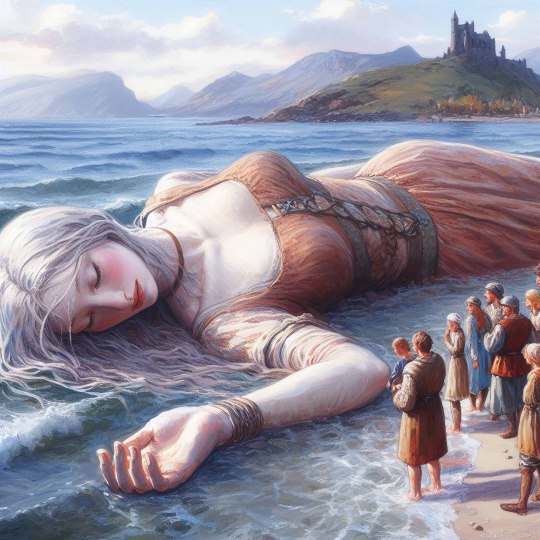
Here is a lil info I achived by reading a few books I bought in Scotland.
Around AD 900, chroniclers on both sides of the Irish Sea reported that a drowned giant woman had been washed ashore in Scotland. She was 195 feet (59.5 metres) tall, with a body as white as a swan, and her hair was 18 feet (5.5 metres) long.
In Annals of Ulster - 891AD
" The Sea threw up a woman in Scotland. She was a hundred and ninety-five feet in height; her hair was seventeen feet long; the finger of her hand was seven feet long, and her nose seven feet. She was all as white as swan’s down."
Chronicon Scotorum - 900 AD - copied from the Annals of Tigernach
"A great woman was cast ashore by the sea in Scotland; her length 192 feet; there were six feet between her two breasts; the length of her hair was 15 feet; the length of a finger on her hand was six feet; the length of her nose was 7 feet. As white as swan’s down or the foam of the wave was every part of her."
Similar descriptions can be found in Annals of Innisfallen (906 AD) and in The Annals of the Four Masters (891AD)
One of the funniest thing about this is the fact that given her proprtions she would have a pretty cool pixie hair cut. lol XD
Source "Scotland a Very Peculiar History" by Fiona Macdonald
#Folklore#Giantess#Fairy Tale#Scotland#GiantWoman#Weridhistory#Giantology#G/t#g/t community#giant/tiny#Legend#History
73 notes
·
View notes
Text

"We are connected, you and I, by a feeling: a thirst. A thirst for pleasure, mastery, and triumph. For life…I will have you at my side as this petty world meets Death."
Entry 3/3 for @h3xxthev3xx ‘s zine! This was a lovely experience to be a part of~ Thank you so much again 💜
Check out the PDF with everyone’s art and thank you’s to the developers here:
#Destiny2Art#Destiny2AOTW#IshtarIllustrated#destiny 2 art#destiny 2#my art#art#drawing#digital art#zine#lore#Destiny lore#the chronicon#dcccvii
25 notes
·
View notes
Text
"[Marozia] was the daughter of the Roman aristocrat Theophylact and of his wife Theodora, a “shameless harlot”, as Liudprand calls her, who taught the “exercise of Venus” to her two daughters. Theophylact controlled the Roman nobility and was able to influence papal elections. Women played a very significant role in the rise of his family. At the beginning of the tenth century his daughter Maria, better known as Marozia, made her appearance on the political scene. Liudprand’s portrait of this lady, her sister and her mother, who controlled Roman politics through their sexual relationships, has become so famous that it has led to the creation of the term “pornocracy”.
After having an affair with Pope Sergius III at a very young age, Marozia married three times. Her first husband was Alberic of Spoleto, by whom she had a son, Alberic. Around 926-927 she married Guy of Tuscany, Hugh’s brother. Theophylact and Theodora both died around 915, leaving Rome in the hands of Marozia. This did not please everyone. A conflict arose in the 910s between Marozia – later supported by her second husband Guy - and Pope John X. The pope had established an alliance with King Hugh of Provence, who threatened Marozia’s interests in Rome and in the nearby territories. The dispute divided Romans into two factions, but Marozia managed to get rid of the Pope and his powerful brother, the marchio Peter. At this point she made sure that her young son John - whom she had had from her relationship with Sergius III - was elected pope.
After the death of Guy, Marozia started to negotiate a political alliance with Hugh, which culminated with the marriage; however it is not certain whether the union was lawful. According to Liudprand, the marriage was an aberration for several reasons. Marozia tried to become queen by selling the city of Rome as if it was her own property; she did not have the necessary qualities to be a queen. The union between an effeminatus king - because he was not able to control his sexual desire - and a woman that was nothing more than a “shameless harlot” could not end well. Hugh had to leave the city because of a revolt against him led by Alberic II, Marozia’s son, who felt threatened by the king’s arrival and by his arrogance.
[...] Further evidence on Marozia and her infamous attempt to become a queen is offered by a late tenth-century text, composed between 972 and 1000, the Chronicon of Benedict, a monk of Sant’Andrea in Soratte (near Ponzano, Latium). This text is mainly the history of the monastery, but also reports Roman political events. Benedict shows a patchy knowledge of the history of Carolingian Europe, and seems not to know many contemporary authors. Nonetheless, he is a precious source for Roman politics, in which he was particularly interested as he greatly admired Alberic II – Marozia’s son - who had patronized his monastery. Because he deals with Roman politics, Benedict has something to say about Theophylact’s family. Even if he is less aggressive than Liudprand – he does not mention the infamous affair between Marozia and the Pope - he is not very partial to Marozia either. He introduces her when mentioning her relationship with her first husband, the margrave of Spoleto, Alberic. According to Benedict the union was not a lawful marriage, but rather a “wicked affair”. Benedict never mentions Marozia’s name. He introduces her as “the daughter of Theophylact”, adding the cryptic sentence “whose name survives” This passage presents significant implications. It is possible that the manuscript’s copyist committed a mistake, omitting the word “non”. In this case, Benedict would have implied that he did not actually know Marozia’s name. However, it is also possible that the sentence was not a mistake, and that Benedict omitted Marozia’s name on purpose, and decided to make his audience aware of that. Marozia’s name was well known in Europe: Liudprand was familiar with these events and even the West Frankish writer Flodoard of Rheims mentions her, reporting that by 933 Marozia was kept prisoner by her son. Therefore it seems quite unlikely that Benedict, who was familiar with Roman political events, had never heard her name.
Even if one assumes that Benedict’s omission was a way to deny visibility to a very controversial lady, he did not avoid recognizing her political influence. He mentioned the conflict that had arisen in the 910s between Marozia and John X. He also defines Marozia as “domna senatrix”, acknowledging her part in Roman politics. However, Benedict sees her success as a political catastrophe: “Rome was subjected to the powerful hand of a woman”. Benedict quotes Isaiah’s prophecy, which foresees the punishment of Jerusalem’s inhabitants for their sins: “And I will give children to be their princes, and the effeminate shall rule over them”. According to Benedict Rome has become a new Jerusalem, in which moral and political decay has produced the distortion of the natural system. This perspective is shared by Liudprand. In his account of the diplomatic mission to Byzantium, the Relatio de Legatione Costantinopolitana, Liudprand reports a dialogue between himself and the Byzantine emperor. In this conversation Nicephoros accuses Liudprand’s patron, Otto I, of having taken “Rome by force” and killed many noble people. In his answer, Liudprand refers to the same biblical quotation: “My Lord did not invade the Roman city by force or in a tyrannical way, but rather he freed it from the yoke of the tyrant, or tyrants. Were not effeminates lording it over Rome, and, what is more serious and sordid, were not whores doing the same?”
Benedict’s version of Marozia’s story is somewhat different from that of Liudprand. Benedict attributes the marriage between Marozia and Hugh to political reasons rather than to Marozia’s sexual appetite. Hugh needed support in Rome in order to become emperor, and Marozia needed external allies as opposition against her was growing. Benedict presents Marozia as the initiator of the negotiations that led to the wedding, and although he does not express an explicit opinion about these facts, he seems to imply that this is an aberration. Benedict and Liudprand share a view according to which female power – or power held by unmanly men - means tyranny. Both their accounts show Marozia’s failure as a wife and a mother, as she puts her sexual appetite and her personal ambition above the interests of her own son. Her shameful behaviour is allowed by the lack of male authority. However, their opinion of Hugh is slightly different. According to Liudprand, Hugh was ruined by his sexual incontinence, whereas Benedict considered him as an evil man, who plotted to blind Alberic, the true hero of the narrative. Moreover, Benedict implicitly condemned the Roman nobility that allowed a woman to take control.
Most importantly, unlike Liudprand Benedict acknowledges Marozia as a queen, as he calls her regina twice; thus presenting her as Hugh’s lawful wife. However, the title does not seem to imply any political prerogatives, at least not through her marriage with Hugh. Benedict only acknowledged Marozia’s influence in Rome, but he portrayed it in a negative way. In other words, according to Benedict power and femininity are ill-suited. His idea recalls that expressed by another Carolingian text, the Annals of Lorsch, which use the same words (“femineum imperium”) to identify and condemn female authority. In describing Charlemagne’s coronation the annalist states that at the time “the name of the emperor was lacking among the Greeks, who were subject to the female imperial rule of Irene”. This does not seem to be the case for Liudprand. He prefers to underline the moral aspect of this degeneration: Roman disorder has to do with the power held by immoral women, meretrices, rather than with female power itself. These differences also reflect the diverse understanding of the two authors with regard to queenship."
— Roberta Cimino, Italian Queens in the Ninth and Tenth Centuries (PHD Thesis, University of St Andrews, 2014)
#I LOVE HER#Marozia#italian history#10th century#historicwomendaily#my post#this is mainly about Marozia's representation in two texts rather than an analysis of her life but I think it's incredibly interesting#women in history#papacy#alberic ii of spoleto#pope john xi
18 notes
·
View notes
Text
Gilbert's first murder was when he was about 10. In a clash with Prussian Pagans, followed by a massacre, he was forced to murder a woman refusing to converting.
Gilbert frequently suffered nightmares about that day for centuries. Eventually she disappeared from his mind. One day the pain became too much and he just stopped caring.
(elaboration for nerds below)
(Peter of Dusburg, a chronicle writer of the Teutonic Order, mentions in his "Chronicon Terrae Prussiae" majorily battles against Prussians in great detail. Elaborating on this Hemann Schreiber claims in his book "Preußen und Baltikum unter den Kreuzrittern" (German) he writes about Prussian deaths with high enthusiasm. Additionally some historians describe the Prussian crusade as a cultural genocide. Gilbert's first murder being de-facto unrighteous is fitting in that sense. He wasnt defending himself. She was tied down. He didn't act out of revenge. He didnt have a reason to kill her but the other knights' pressuring him.)
(If you have some books elaborating on it further or additional info; comment. Its very hard to find accounts of it that aren't paywalled or hid from the public.)
#tw murder#tw genocide#tw genocide mention#historical hetalia#aph#hws#aph prussia#hws prussia#hetalia#hetalia prussia#aph teutonic knights#hws teutonic knights#hetalia teutonic knights
7 notes
·
View notes
Text
youtube
New video on YouTube! Today I'm checking out Chronicon, a cool little indie Action RPG!
#youtube#gaming#pc gaming#pc games#youtuber#small youtuber#ARPG#Chronicon#Action RPG#Roleplaying Games#PC Gaming
0 notes
Text
yo wait this is interesting
"The kingdom of Lavinius having been left to his stepmother, Ascanius founded Alba Longa, and with the greatest loving piety raised his brother Sylvius Posthumus, son of Aeneas by Lavinia" -St. Jerome, Chronicon
bro (whoever is reading this is now my brother) I swear to god there are so many variations of Ascanius and his stepmother lavinia but there is no like... big epic fight. they always come back together. Sometimes he tries to kill his step-brother, but I prefer the version where its a big silly if not sad misunderstanding that's kinda awkward maybe ill post it later. (cant let Neoparasite fans see the source of him adopting astyanax)
But overall, Lavinia herself being the person to rule the kingdom after Aeneas' death is so interesting, and I mean it makes sense, ascanius is like 16 or even younger at the time, lmao, and this still lists him as king, so it seems like he would become king after Lavinia.
i can feel the hyperfixation forming....
#greek mythology#ancient greece#ancient greek mythology#roman mythology#ascanius#lavinia#latnium#aeneas#sylvius
5 notes
·
View notes
Text
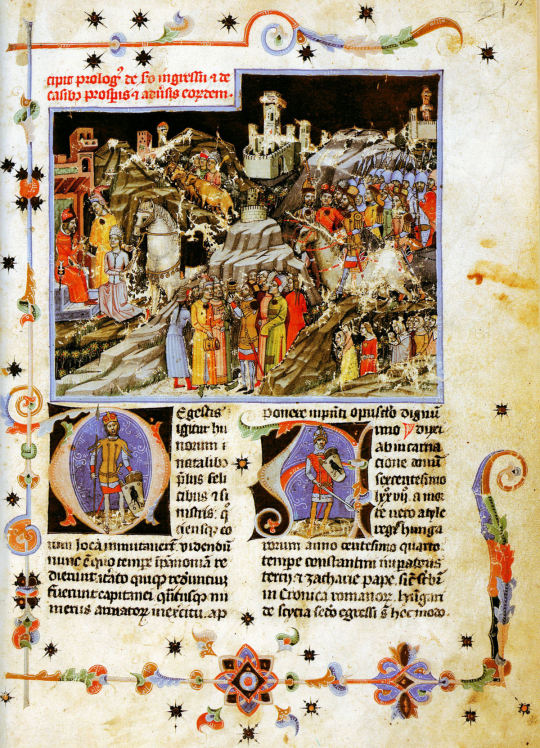
The Arrival of the Hungarians in Pannonia, from the Chronicon Pictum (page 21). Manuscript from 14th C. CE
"The Arrival of the Hungarians in Pannonia: The image shows several scenes at the same time. In the middle, Árpád tastes the water of the Danube from a drinking horn, the Hungarians are shouting the name of God three times, Kusid stands on his left with a drinking pot in his hand. On the left, Svatopluk is sitting on a throne, he receives Kusid, the ambassador of the Hungarians. The kneeling stableman of Kusid holds a white horse with a golden saddle. In the middle from the right, Árpád rides on a white horse with six captains and armored spear fighters. On the right in the foreground, a group of women and children comes from a road. The background of the whole picture is a rocky mountain landscape with castles, shepherds are driving cattles on the rocks.
According to Hungarian legends, the Hungarians purchased the country from Svatopluk in a symbolic act of exchange: they sent a white horse with saddle to Svatopluk in return for some earth, water and grass, supposed to represent his country itself. Svatopluk allegedly disavowed this "contract" and then drowned in the Danube in flight from the Hungarians.
Előd, Hungarian Chieftain: Below the main illustration, in the initial "D", Előd, father of Álmos, holds a spear, relies on a Turul shield. (It is not clear from the text whether the leader depicted is Előd or Árpád.)
Álmos, Hungarian Chieftain: Below the main illustration, in the initial "A", Álmos, Grand Prince of the Hungarians holds a sword, and a Turul shield in his hand. (It is not entirely clear whether Álmos or Árpád is the leader depicted.)"
-taken from Wikipedia and the Illuminated Chronicle
#hungarian art#history#art#literature#medieval literature#middle ages#medieval art#manuscript#magyar#finno ugric#illuminated manuscript
122 notes
·
View notes
Text
Henry had a physical catatonia associated with his assumed mental breakdown, which most modern scholars mention secondarily. There are no contemporary accounts of the moment or day of his attack; instead, there are only glimpses from distant, second-hand witnesses. Benet’s Chronicle simply said that “the king became very ill” and that “his sickness lasted a long time.” Bale’s Chronicle added to the story, that “the king suddenly became indisposed, his wit and reason withdrawn.” The Incerti Scriptoris Chronicon Angliae text said in quite a different tone, “the king suffered a sudden and unexpected fright, becoming so ill that, for a year and a half, he lacked both natural sense and intelligence sufficient to govern the realm. No doctor or medicine could cure him.” All of these accounts were written long after Henry became ill in July of 1453 and none of these writers had seen the king; they were only reporting what they had heard. It is the “sudden and unexpected fright” in the Chronicon Angliae, which has led many scholars to re-look at Charles’s crisis that took place away from home, on a hot day (Charles had complained of the heat earlier that day) in August, at a moment of an unexpected fright. Charles recovered his abilities within a couple of days while Henry remained incapacitated for about sixteen months. Whatever Henry’s disability was, it seems to have had a quick onset.
Wendy J. Turner, “A Cure for the King means Health for the Country: The Mental and Physical Health of Henry VI", Madness in Medieval Law and Custom (Brill 2010)
8 notes
·
View notes